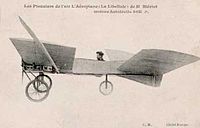Tandem wing
Appearance
This article includes a list of references, related reading, or external links, but its sources remain unclear because it lacks inline citations. (December 2009) |

A tandem wing aircraft has two main wings, with one located forward and the other to the rear. Both wings contribute to lift.
Tandem wing aircraft may be distinguished from:
- A biplane whose wings are stacked more or less vertically, one above the other, and where a separate tailplane surface is required,
- A Delanne wing aircraft (such as the Mignet Pou-du-Ciel) where the rearmost tandem wing is smaller than the forward wing, thereby resembling an outsize tailplane.
- A canard or "tail-first" configuration where the forward surface is much smaller and contributes primarily to control and/or stability.[1]
Design principles
A tandem wing configuration has two main wing planes, with one located forward and the other to the rear. Compared to a conventional monoplane, where the tailplane exerts a balancing downforce, both tandem wings contribute to lift. In aircraft such as the QAC Quickie Q2, the forward wing may double as support for the landing gear.
In a tandem wing design the lift vectors on the two wings are spread far apart longitudinally, allowing them to act in concert to achieve stability and control.
Tandem wings have also been used on ground-effect vehicles.
Designers using tandem wings
Examples
- Langley Aerodrome - 1890s-1900s, Langley's first tandem wings were steam-powered unmanned aircraft, manned attempts in 1903 failed to achieve take-off.
- Montgomery Aeroplane and The Santa Clara tandem wing gliders - 1903–1905.
- Blériot VI - 1907, designed by Louis Peyret
- Caproni Ca.60 - 1921
- Peyret Tandem - 1922 - winner at the first British Glider Competition at Itford in 1922
- Mignet Pou-du-Ciel - 1933 - the most popular and imitated pre-World War II design
- SFCA Taupin - 1936
- Mauboussin Hémiptère - 1936
- Arsenal-Delanne 10 - 1940
- Westland P.12 Lysander Delanne - 1940, modification of a Lysander observation aircraft with a gun turret replacing the conventional empennage
- Miles M.35 Libellula and Miles M.39B Libellula - 1942–1945, an experimental fighter and a scaled bomber design
- Curtiss-Wright X-19 - 1963 - Four rotor convertiplane
- Lockspeiser LDA-01 - 1971 - utility transport sub-scale research aircraft
- Rutan Quickie - 1978
- Viking Dragonfly - 1980
- Scaled Composites ATTT - 1986
- Scaled Composites Proteus - 1998
Gallery
-
Montgomery The Santa Clara (1905)
-
Blériot VI Libellule (1907)
-
Langley Aerodrome, modified (1914)
-
Pou-du-Ciel (1933 onwards)
-
Miles M.39B (1943)
-
Scaled Composites Proteus (1998)
See also
Notes
- ^ Note: tandem wings and canards differ mainly in degree: for instance, the fore-wing on the Miles M.39B is large for a canard but rather small for a tandem wing.
References
- Miles, George H (27 April 1944). "The Tandem Monoplane Its Merits and Drawbacks Compared with those of Tailless, Tail first and Allwing Designs : Libellula Suggested as Name for Class" (pdf). Flight.
- Spreadsheet detailing math analysis of tandem wing aerodynamics
- More math, including Flying Flea tandem wing design
- The Tandem Monoplane Does it Still Have a Future? : Some Past Experiences Recalled
- Reviving the Tandem






